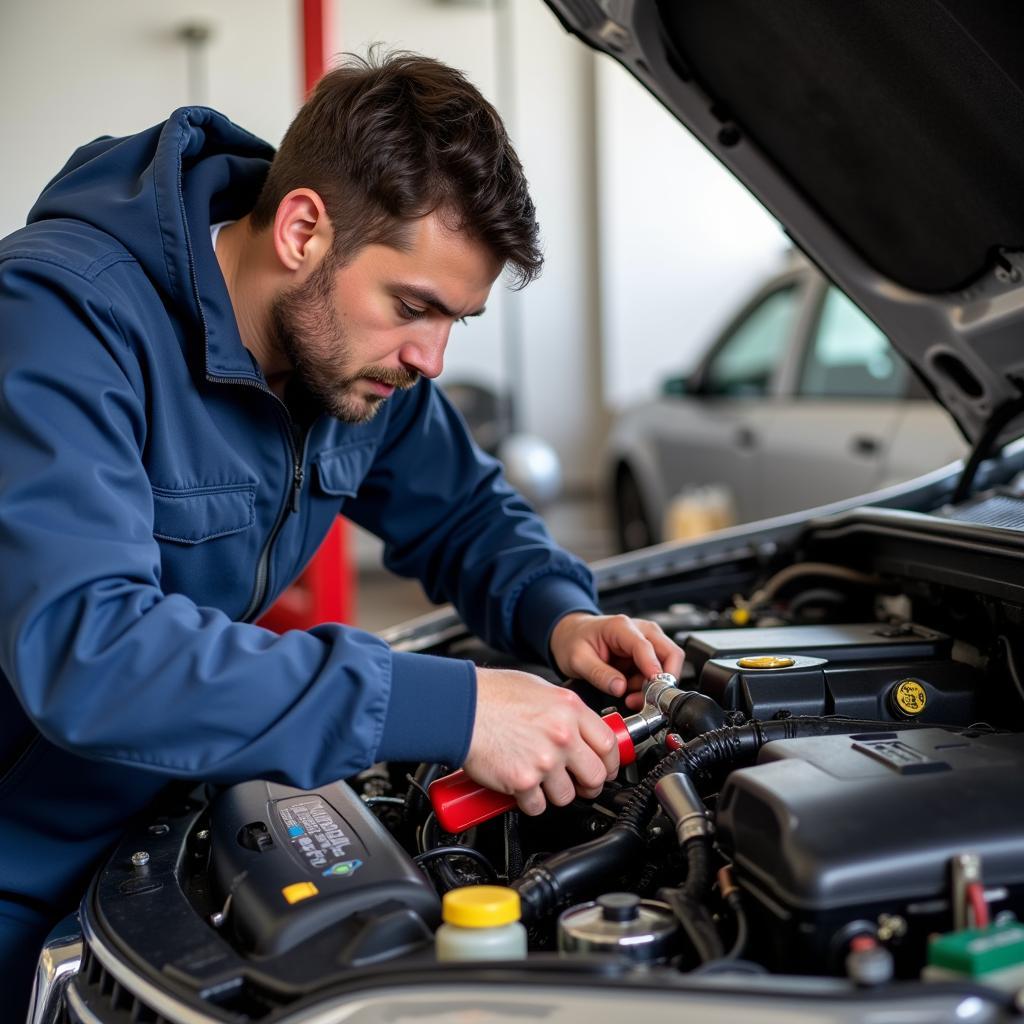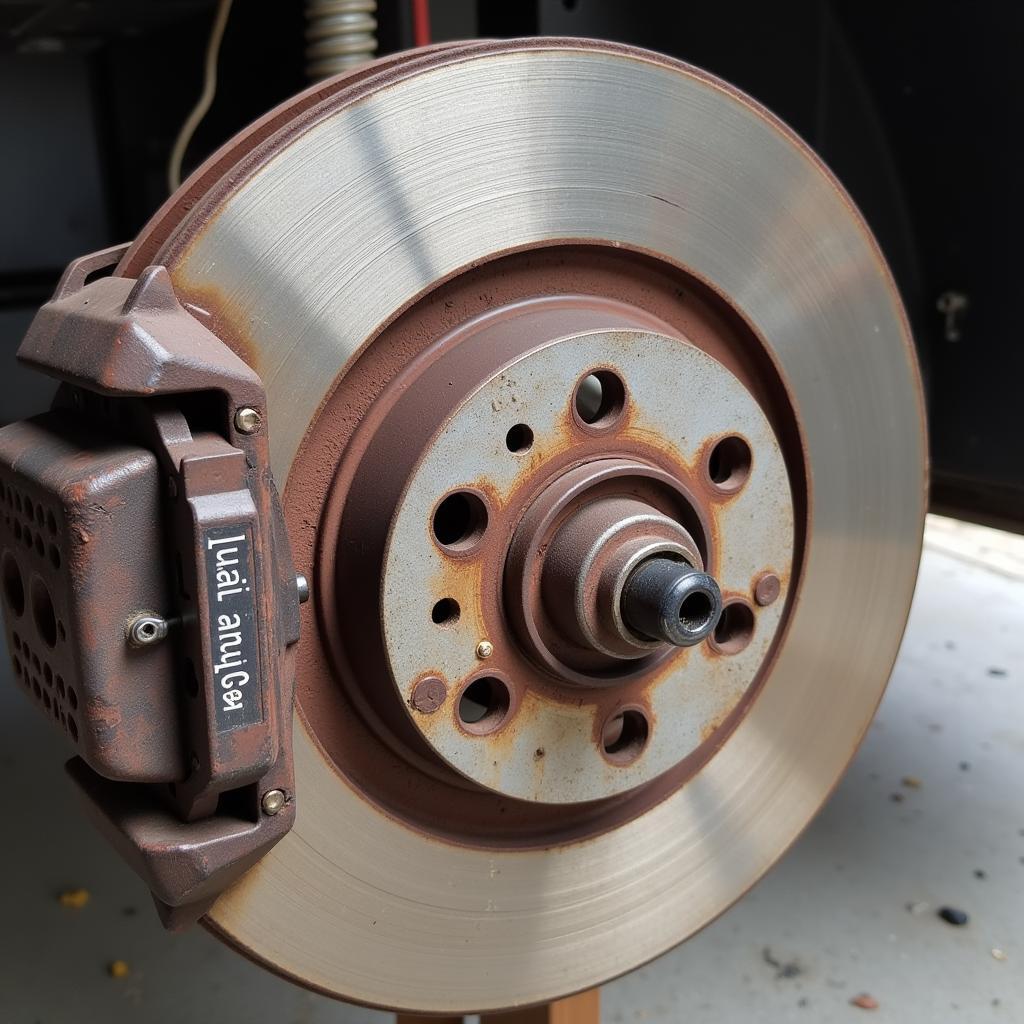Fixing Air Conditioner In Car issues can be a real headache, especially during scorching summers. Whether it’s just blowing warm air, making strange noises, or not working at all, a malfunctioning AC can make driving uncomfortable and even unbearable. This guide provides a comprehensive overview of common car AC problems, troubleshooting techniques, and DIY repair solutions.
Understanding Your Car’s AC System
Before diving into fixing air conditioner in car problems, it’s crucial to understand the basic components and how they work together. The system comprises a compressor, condenser, evaporator, expansion valve or orifice tube, and refrigerant. The compressor pressurizes the refrigerant, the condenser cools it down, the evaporator absorbs heat from the cabin air, and the expansion valve regulates refrigerant flow. A proper understanding of these components can help you pinpoint the source of the problem more effectively.
Common Car AC Problems and Solutions
Several issues can plague your car’s AC system. Here are some of the most frequent culprits:
-
Low Refrigerant: This is often the primary cause of a poorly performing AC. Symptoms include warm air blowing from the vents and reduced cooling capacity. A leak in the system can lead to refrigerant loss.
-
Faulty Compressor: The compressor is the heart of the AC system. A failing compressor can lead to no cold air at all, unusual noises, or even complete system failure.
-
Clogged Condenser: Located at the front of the vehicle, the condenser can become clogged with debris, restricting airflow and reducing cooling efficiency.
-
Malfunctioning Expansion Valve or Orifice Tube: These components regulate the refrigerant flow. A malfunction can lead to inconsistent cooling or complete system failure.
-
Electrical Issues: Problems with wiring, fuses, relays, or the AC control switch can also prevent the system from working correctly.
Diagnosing and Fixing Air Conditioner in Car Issues
Diagnosing the specific issue requires some investigative work. Start by checking the simplest things first:
-
Check the Fuse and Relay: Locate the AC fuse and relay in your car’s fuse box and check for any blown fuses or faulty relays. Replace them if necessary.
-
Inspect the Refrigerant Level: While a professional should handle refrigerant, you can visually inspect the sight glass on the receiver-drier for proper refrigerant level. Low refrigerant usually indicates a leak.
-
Check for Leaks: Look for signs of oil leaks around the compressor, condenser, and hoses. UV dye can be added to the system to help detect leaks.
-
Test the Compressor: With the engine running and AC on, check if the compressor clutch is engaging. If not, there might be an electrical issue or a faulty compressor.
DIY Fixes for Minor AC Problems
Some minor AC problems can be fixed at home with basic tools:
-
Replacing the Cabin Air Filter: A dirty cabin air filter can restrict airflow and reduce cooling efficiency. Replacing it is a simple and inexpensive DIY task.
-
Cleaning the Condenser: Carefully clean the condenser fins with a fin comb or compressed air to remove debris and improve airflow.
-
Checking and Replacing Fuses and Relays: As mentioned earlier, checking and replacing fuses and relays is a straightforward DIY fix for electrical issues.
“Regular maintenance is key to preventing major AC problems. Simple tasks like cleaning the condenser and replacing the cabin air filter can significantly extend the life of your AC system.” – John Davies, Automotive Engineer at Cooling Solutions Inc.
When to Seek Professional Help
While some AC problems can be tackled at home, more complex issues require professional expertise. If you suspect a major problem with the compressor, expansion valve, or refrigerant leaks, it’s best to take your car to a qualified mechanic. Attempting complex repairs without proper knowledge and tools can lead to further damage and higher repair costs.
 Mechanic Fixing Car AC System
Mechanic Fixing Car AC System
Conclusion
Fixing air conditioner in car problems can range from simple DIY fixes to complex repairs requiring professional assistance. Understanding the basic components of the AC system, common problems, and troubleshooting techniques can help you identify the issue and determine the best course of action. Regular maintenance and timely repairs can ensure your car’s AC keeps you cool and comfortable on the road. For further assistance and professional advice, connect with us at AutoTipPro. Call us at +1 (641) 206-8880 or visit our office at 500 N St Mary’s St, San Antonio, TX 78205, United States.
“Ignoring minor AC issues can lead to more significant and costly problems down the road. Addressing problems promptly can save you money and hassle in the long run.” – Maria Sanchez, Lead Technician at Auto Cool Experts.
FAQ
- How often should I recharge my car’s AC? A properly functioning AC system shouldn’t require frequent recharging. If you need to recharge often, there’s likely a leak that needs to be addressed.
- Why is my car AC blowing hot air? Several factors can cause this, including low refrigerant, a faulty compressor, or electrical problems.
- How much does it cost to fix a car AC? The cost varies depending on the specific problem and the labor rates in your area.
- Can I add refrigerant to my car AC myself? While it’s possible, it’s generally recommended to have a professional handle refrigerant due to safety and environmental concerns.
- How can I prevent car AC problems? Regular maintenance, such as cleaning the condenser and replacing the cabin air filter, can help prevent major AC issues.
- What are the signs of a failing car AC compressor? Unusual noises, reduced cooling performance, or no cold air at all can indicate a failing compressor.
- Why is my car AC making a clicking noise? A clicking noise could be due to a faulty relay, a problem with the compressor clutch, or other electrical issues.





Leave a Reply